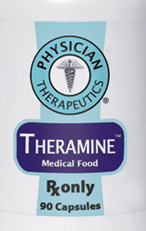Theramine for Migraine?
Theramine is a supplement that is commonly used for chronic pain. Could it work for migraine?
 |
Theramine has actually been primarily marketed for chronic back pain. As a “medical food”, it is designed to meet the special requirements of those with chronic pain. As the product’s info sheet says:
Patients with pain disorders and inflammatory conditions are known to have increased nutritional requirements for tryptophan, choline, arginine, GABA, flavonoids, and certain antioxidants. These nutritional requirements are such that they cannot be achieved by the modification of the normal diet alone, or by supplementing the diet. Patients with pain disorders and inflammatory conditions frequently exhibit reduced plasma levels of tryptophan and GABA, and have been shown to respond to oral administration of GABA, arginine, tryptophan, or a 5-hydroxytryptophan formulation.
Theramine has a collection of ingredients which may – or may not – be of help to migraine sufferers. Certainly some of the ingredients have shown promise for migraine treatment. But, as with so many supplements, the interactions of different ingredients with different patients can be a very complex thing to study. And doing good trials on every supplement is a very difficult, lengthy, and expensive endeavour.
The good news is that Theramine seems to be generally safe, with the occasional mild side effect for some patients. It may also be taken along with other treatments (check with your doctor first!). It seems to be helpful for some with chronic pain, and so researchers are going to check to see what kind of benefit there may be for those with migraine.
The Theramine study, which should be open to participants soon, with involve patients with episodic (not chronic) migraine, to see if Theramine reduces the number of days with headache. Researchers will also check to see if participants are less disabled and have fewer migraine attacks in general.
If you have tried Theramine for migraine, tell us about it. Did it help?

9 October 2013 @ 6:45 pm
This really hits home for me, as I have long wondered why I seem less prone to headaches when I have certain foods in my diet. That is kind of the reverse approach relative to looking for triggers, but I’ve considered it from both directions and am somewhat convinced that I’m missing something essential. Figuring out what that is is a royal pain to be sure, but I do try. I’ll be curious to see how this progresses!
9 October 2013 @ 9:25 pm
I take both vitamin B2 and Magnuism and some time potassium if I don’t eat a lot during the day they all seem to help me, I guess I’ll try this one also
11 October 2013 @ 5:09 pm
After reading this I did a little research ~ only because I hadn’t heard anything about it. I just find it odd that this medical food is currently being used for chronic pain but the clinical trial for migraine will only be done on those with episodic migraine. I wonder why not chronic migraine? I need to do more research, but it may be worth talking to my doctor about. Actually, both my headache doc and my back doc….maybe kill two birds with one stone!